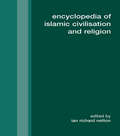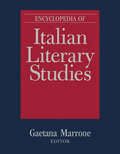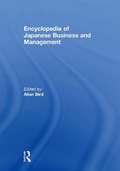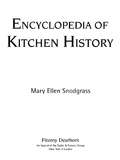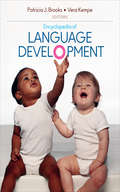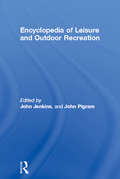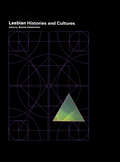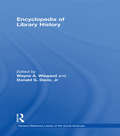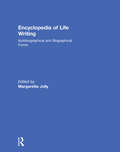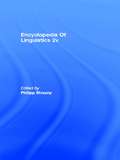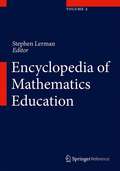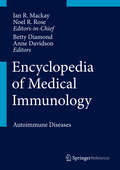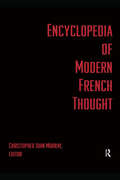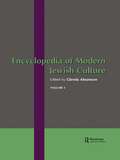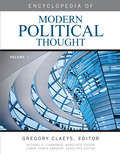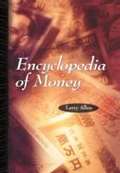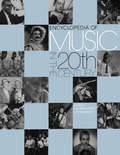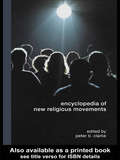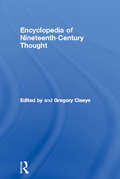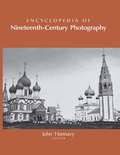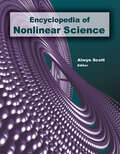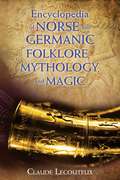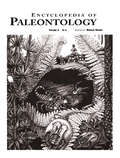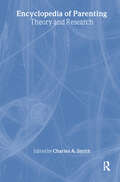- Table View
- List View
Encyclopedia of Islamic Civilization and Religion
by Ian Richard NettonThe Encyclopedia of Islamic Civilization and Religion provides scholarly coverage of the religion, culture and history of the Islamic world, at a time when that world is undergoing considerable change and is a focus of international study and debate. The non-Muslim world's perceptions of Islam have often tended to be dominated by unrepresentative radical extremist movements and media interpretations of events involving such movements, to the extent that many people are unaware of the depth and variety of Islamic thought. At the same time, many who have had a formal training in Islamic studies have tended to concentrate on the traditional, to the exclusion of the contemporary. The Encyclopedia of Islamic Civilization and Religion covers the full range of Islamic thought, in historical depth, but it also provides substantial coverage of contemporary trends across the Muslim world. With well over a thousand entries on Islamic theology, history, arts, science, law and institutions, and coverage of Islam in individual countries and cities around the world, the Encyclopedia of Islamic Civilization and Religion provides an extremely rich resource for students and researchers in religious studies and Middle Eastern studies. Entries are cross-referenced and bibliographies are provided. There is a full index. Routledge published The Qura'n: An Encyclopedia in 2005, an excellent companion to the Encyclopedia of Islamic Civilization and Religion.
Encyclopedia of Italian Literary Studies
by Luca Somigli Gaetana Marrone Paolo PuppaThe Encyclopedia of Italian Literary Studies is a two-volume reference book containing some 600 entries on all aspects of Italian literary culture. It includes analytical essays on authors and works, from the most important figures of Italian literature to little known authors and works that are influential to the field. The Encyclopedia is distinguished by substantial articles on critics, themes, genres, schools, historical surveys, and other topics related to the overall subject of Italian literary studies. The Encyclopedia also includes writers and subjects of contemporary interest, such as those relating to journalism, film, media, children's literature, food and vernacular literatures. Entries consist of an essay on the topic and a bibliographic portion listing works for further reading, and, in the case of entries on individuals, a brief biographical paragraph and list of works by the person. It will be useful to people without specialized knowledge of Italian literature as well as to scholars.
Encyclopedia of Japanese Business and Management
by Allan BirdThe Encyclopedia of Japanese Business and Management is the definitive reference source for the exploration of Japanese business and management. Reflecting the multidisciplinary nature of this field, the Encyclopedia consolidates and contextualises the leading research and knowledge about the Japanese business system and Japanese management thought and practice. It will be welcomed by scholar and student alike as an essential resource for teaching, an invaluable companion to independent study, and a solid starting point for wider exploration.
Encyclopedia of Kitchen History
by Mary Ellen SnodgrassFirst published in 2005. Routledge is an imprint of Taylor & Francis, an informa company.
Encyclopedia of Language Development
by Dr Patricia J. Brooks Vera KempeThe progression from newborn to sophisticated language user in just a few short years is often described as wonderful and miraculous. What are the biological, cognitive, and social underpinnings of this miracle? What major language development milestones occur in infancy? What methodologies do researchers employ in studying this progression? Why do some become adept at multiple languages while others face a lifelong struggle with just one? What accounts for declines in language proficiency, and how might such declines be moderated? Despite an abundance of textbooks, specialized monographs, and a couple of academic handbooks, there has been no encyclopedic reference work in this area--until now. The Encyclopedia of Language Development covers the breadth of theory and research on language development from birth through adulthood, as well as their practical application. Features: This affordable A-to-Z reference includes 200 articles that address such topic areas as theories and research tradition; biological perspectives; cognitive perspectives; family, peer, and social influences; bilingualism; special populations and disorders; and more. All articles (signed and authored by key figures in the field) conclude with cross reference links and suggestions for further reading. Appendices include a Resource Guide with annotated lists of classic books and articles, journals, associations, and web sites; a Glossary of specialized terms; and a Chronology offering an overview and history of the field. A thematic Reader’s Guide groups related articles by broad topic areas as one handy search feature on the e-Reference platform, which includes a comprehensive index of search terms. Available in both print and electronic formats, Encyclopedia of Language Development is a must-have reference for researchers and is ideal for library reference or circulating collections.
Encyclopedia of Leisure and Outdoor Recreation
by John M. Jenkins John J. PigramThis is a key reference guide for the exploration of leisure and outdoor recreation. It reflects the multidisciplinary nature of these fields and contextualizes the leading research and knowledge on key concepts, theories and practices. Edited by leading authorities in the field, this volume includes a comprehensive index, and up-to-date suggestions for further reading. It is an essential resource for teaching, an invaluable companion to independent study, and a solid starting point for wider subject exploration.
Encyclopedia of Lesbian Histories and Cultures: An Encyclopedia (Encyclopedias of Contemporary Culture)
by Bonnie ZimmermanA rich heritage that needs to be documented Beginning in 1869, when the study of homosexuality can be said to have begun with the establishment of sexology, this encyclopedia offers accounts of the most important international developments in an area that now occupies a critical place in many fields of academic endeavours. It covers a long history and a dynamic and ever changing present, while opening up the academic profession to new scholarship and new ways of thinking. A groundbreaking new approach While gays and lesbians have shared many aspects of life, their histories and cultures developed in profoundly different ways. To reflect this crucial fact, the encyclopedia has been prepared in two separate volumes assuring that both histories receive full, unbiased attention and that a broad range of human experience is covered. Written for and by a wide range of people Intended as a reference for students and scholars in all fields, as well as for the general public, the encyclopedia is written in user-friendly language. At the same time it maintains a high level of scholarship that incorporates both passion and objectivity. It is written by some of the most famous names in the field, as well as new scholars, whose research continues to advance gender studies into the future.
Encyclopedia of Library History
by Donald G. Davis Wayne A. WiegandFirst Published in 1994. Routledge is an imprint of Taylor & Francis, an informa company.
Encyclopedia of Life Writing: Autobiographical and Biographical Forms
by Margaretta JollyFirst published in 2001. Routledge is an imprint of Taylor & Francis, an informa company.
Encyclopedia of Linguistics
by Philipp StraznyUtilizing a historical and international approach, this valuable two-volume resource makes even the more complex linguistic issues understandable for the non-specialized reader. Containing over 500 alphabetically arranged entries and an expansive glossary by a team of international scholars, the Encyclopedia of Linguistics explores the varied perspectives, figures, and methodologies that make up the field.
Encyclopedia of Mathematics Education
by Stephen LermanThe Encyclopedia of Mathematics Education is a comprehensive reference text, covering every topic in the field with entries ranging from short descriptions to much longer pieces where the topic warrants more elaboration. The entries provide access to theories and to research in the area and refer to the leading publications for further reading. Links will also be made to particular texts in Springer journals and e-books through SpringerReference. com. The Encyclopedia is aimed at graduate students, researchers, curriculum developers, policy makers, and others with interests in the field of mathematics education. It is planned to be 700 pages in length in its hard copy form but the text will subsequently be up-dated and developed on-line in a way that retains the integrity of the ideas, the responsibility for which will be in the hands of the Editor-in-Chief and the Editorial Board. Editorial Board: Michele ArtigueRuhama EvenMelony GravenEva JablonkaRobyn JorgensenYoshinori ShimizuBharath Sriraman
Encyclopedia of Medical Immunology
by Anne Davidson Ian R. Mackay Noel R. Rose Betty DiamondDifferent from other resources, this volume offers a broad appeal to microbiologists, immunologists, and infectious disease specialists on Autoimmune Diseases. The volume covers topics such as skin and alopecia, Kidney, Liver, Paraneoplastic, Resolution of inflammation, Cardiovascular/systemic inflammation and atherosclerosis, Gut, Regulatory lymphocytes T, B, other and Rheumatic Disease. The volume is written by internationally renowned authors who are authorities in their respective fields.
Encyclopedia of Modern French Thought
by Christopher John MurrayIn this wide-ranging guide to twentieth-century French thought, leading scholars offer an authoritative multi-disciplinary analysis of one of the most distinctive and influential traditions in modern thought. Unlike any other existing work, this important work covers not only philosophy, but also all the other major disciplines, including literary theory, sociology, linguistics, political thought, theology, and more.
Encyclopedia of Modern Jewish Culture
by Glenda AbramsonThe Encyclopedia of Modern Jewish Culture is an extensively updated revision of the very successful Companion to Jewish Culture published in 1989 and has now been updated throughout. Experts from all over the world contribute entries ranging from 200 to 1000 words broadly, covering the humanities, arts, social sciences, sport and popular culture, and 5000-word essays contextualize the shorter entries, and provide overviews to aspects of culture in the Jewish world. Ideal for student and general readers, the articles and biographies have been written by scholars and academics, musicians, artists and writers, and the book now contains up-to-date bibliographies, suggestions for further reading, comprehensive cross referencing, and a full index. This is a resource, no student of Jewish history will want to go without.
Encyclopedia of Modern Political Thought (set)
by Gregory ClaeysThis groundbreaking new work explores modern and contemporary political thought since 1750, looking at the thinkers, concepts, debates, issues, and national traditions that have shaped political thought from the Enlightenment to post-modernism and post-structuralism. Encyclopedia of Modern Political Thought is two-volume A to Z reference that provides historical context to the philosophical issues and debates that have shaped attitudes toward democracy, citizenship, rights, property, duties, justice, equality, community, law, power, gender, race, and legitimacy over the last three centuries. It profiles major and minor political thinkers, and the national traditions, both Western and non-Western, which continue to shape and divide political thought. More than 200 scholars from leading international research institutions and organizations have provided signed entries that offer comprehensive coverage of: Thought of regions and countries, including African political thought, American political thought , Australasian political thought (Australian and New Zealand), Chinese political thought, Indian political thought, Islamic political Thought, Japanese political thought, and more Thought regarding contemporary issues such as abortion, affirmative action, animal rights, European integration, feminism, humanitarian intervention, international law, race and racism, and more The ideological spectrum from Marxism to neoconservatism, including anarchism, conservatism, Darwinism and Social Darwinism, Engels, fascism, the Frankfurt School, Lenin and Leninism, socialism, and more Connections of political thought to key areas of politics and other disciplines such as economics, psychology, law, and religion Notable time periods of political thought since 1750 Concepts including class, democratic theory, liberalism, nationalism, natural and human rights, and theories of the state Theorists and political intellectuals, both Western and non-Western including John Adams, Edmund Burke, Mohandas Gandhi, Immanuel Kant, Ayatollah Khomeini, Ernst Friedrich Schumacher, George Washington, and Mary Wollstonecraft
Encyclopedia of Modern Political Thought (set)
by Gregory ClaeysThis groundbreaking new work explores modern and contemporary political thought since 1750, looking at the thinkers, concepts, debates, issues, and national traditions that have shaped political thought from the Enlightenment to post-modernism and post-structuralism. Encyclopedia of Modern Political Thought is two-volume A to Z reference that provides historical context to the philosophical issues and debates that have shaped attitudes toward democracy, citizenship, rights, property, duties, justice, equality, community, law, power, gender, race, and legitimacy over the last three centuries. It profiles major and minor political thinkers, and the national traditions, both Western and non-Western, which continue to shape and divide political thought. More than 200 scholars from leading international research institutions and organizations have provided signed entries that offer comprehensive coverage of: Thought of regions and countries, including African political thought, American political thought , Australasian political thought (Australian and New Zealand), Chinese political thought, Indian political thought, Islamic political Thought, Japanese political thought, and more Thought regarding contemporary issues such as abortion, affirmative action, animal rights, European integration, feminism, humanitarian intervention, international law, race and racism, and more The ideological spectrum from Marxism to neoconservatism, including anarchism, conservatism, Darwinism and Social Darwinism, Engels, fascism, the Frankfurt School, Lenin and Leninism, socialism, and more Connections of political thought to key areas of politics and other disciplines such as economics, psychology, law, and religion Notable time periods of political thought since 1750 Concepts including class, democratic theory, liberalism, nationalism, natural and human rights, and theories of the state Theorists and political intellectuals, both Western and non-Western including John Adams, Edmund Burke, Mohandas Gandhi, Immanuel Kant, Ayatollah Khomeini, Ernst Friedrich Schumacher, George Washington, and Mary Wollstonecraft
Encyclopedia of Money
by Larry AllenThis illustrated volume tells the story of money, from early barter commodities to today's ubiquitous credit card. Three hundred plus entries describe the innovations, experiments, triumphs, and disasters in the development of viable media of exchange. Individual entries spotlight international monetary systems, hyperinflation, monetary debacles, fiscal controls and the gold standard. Written for non-specialists, the book avoids technical jargon and mathematics as it explains the mechanisms and intricacies of its subject.
Encyclopedia of Music in the 20th Century
by Lee Stacy Lol HendersonThe Encyclopedia of Music in the 20th Century is an alphabetically arranged encyclopedia of all aspects of music in various parts of the world during the 20th century. It covers the major musical styles--concert music, jazz, pop, rock, etc., and such key genres as opera, orchestral music, be-bop, blues, country, etc. Articles on individuals provide biographical information on their life and works, and explore the contribution each has made in the field.Illustrated and fully cross-referenced, the Encyclopedia of Music in the 20th Century also provides Suggested Listening and Further Reading information. A good first point of reference for students, librarians, and music scholars--as well as for the general reader.
Encyclopedia of New Religious Movements
by Peter B. ClarkeNew Religious Movements (NRMs) can involve vast numbers of followers and in many cases are radically changing the way people understand and practice religion and spirituality. Moreover, many are having a profound impact on the form and content of mainstream religion. The Encyclopedia of New Religious Movements provides uniquely global coverage of the phenomenon, with entries on over three-hundred movement from almost every country in the world. Coverage includes movements that derive from the major religions of the world and to neo-traditional movements, movements often overlooked in the study of NRMs. In addition to the coverage of particular movements there are also entries on topics, themes, key thinkers and key ideas, for example the New Age Movement, Neo-Paganism, New Religion and gender, NRMs and cyberspace, NRMs and the law, the Anti-Cult Movement, Swedenborg, Jung, Teilhard de Chardin, Lovelock, Gurdjieff, al-Banna, Qutb. The marked global approach and comprehensiveness of the encyclopedia enable an appreciation of the innovative energy of NRMs, of their extraordinary diversity, and the often surprising ways in which they can propagate geographically. The most ambitions publication of its sort, the Encyclopedia of New Religious Movements is a major addition to the reference literature for students and researchers of the field in religious studies and the social sciences. Entries are cross-referenced with short bibliographies for further reading. There is a full index.
Encyclopedia of Nineteenth Century Thought
by Gregory ClaeysEncyclopedia of Nineteenth Century Thought provides essential information on, and a critical interpretation of, nineteenth-century thought and nineteenth-century thinkers. The project takes as its temporal boundary the period 1789 to 1914. Encyclopedia of Nineteenth Century Thought primarily covers social and political thinking, but key entries also survey science, religion, law, art, concepts of modernity, the body and health, and so on, and thereby take into account all of the key developments in the intellectual history of the period. The encyclopedia is alphabetically organized, and consists of:* principal entries, divided into ideas (4000 words) and persons (2500 words)* subsidiary entries of 1000 words, which are entirely biographical* informational entries of 500 words, which are also biographical.
Encyclopedia of Nineteenth-Century Photography
by John HannavyThe Encyclopedia of Nineteenth-Century Photography is the first comprehensive encyclopedia of world photography up to the beginning of the twentieth century. It sets out to be the standard, definitive reference work on the subject for years to come. Its coverage is global – an important ‘first’ in that authorities from all over the world have contributed their expertise and scholarship towards making this a truly comprehensive publication. The Encyclopedia presents new and ground-breaking research alongside accounts of the major established figures in the nineteenth century arena. Coverage includes all the key people, processes, equipment, movements, styles, debates and groupings which helped photography develop from being ‘a solution in search of a problem’ when first invented, to the essential communication tool, creative medium, and recorder of everyday life which it had become by the dawn of the twentieth century. The sheer breadth of coverage in the 1200 essays makes the Encyclopedia of Nineteenth-Century Photography an essential reference source for academics, students, researchers and libraries worldwide.
Encyclopedia of Nonlinear Science
by Alwyn ScottIn 438 alphabetically-arranged essays, this work provides a useful overview of the core mathematical background for nonlinear science, as well as its applications to key problems in ecology and biological systems, chemical reaction-diffusion problems, geophysics, economics, electrical and mechanical oscillations in engineering systems, lasers and nonlinear optics, fluid mechanics and turbulence, and condensed matter physics, among others.
Encyclopedia of Norse and Germanic Folklore, Mythology, and Magic
by Claude LecouteuxA thorough reference to the many deities, magical beings, mythical places, and ancient customs of the Norse and Germanic regions of Europe • Explores the legends and origins of well-known gods and figures such as Odin, Thor, Krampus, and the Valkyries, as well as a broad range of magical beings such as the Elf King, the Lorelei, the Perchten, dwarves, trolls, and giants • Draws upon a wealth of well-known and rare sources, such as the Poetic Edda and The Deeds of the Danes by Saxo Grammaticus • Examines folktales, myths, and magical beliefs from Germany, Austria, Switzerland, Denmark, Finland, Sweden, Norway, Iceland, and England The legends of the Norse and Germanic regions of Europe--spanning from Germany and Austria across Scandinavia to Iceland and England--include a broad range of mythical characters and places, from Odin and Thor, to berserkers and Valhalla, to the Valkyries and Krampus. In this encyclopedia, Claude Lecouteux explores the origins, connections, and tales behind many gods, goddesses, magical beings, rituals, folk customs, and mythical places of Norse and Germanic tradition. More than a reference to the Aesir and the Vanir pantheons, this encyclopedia draws upon a wealth of well-known and rare sources, such as the Poetic Edda, the Saga of Ynglingar by Snorri Sturluson, and The Deeds of the Danes by Saxo Grammaticus. Beyond the famous and infamous Norse gods and goddesses, Lecouteux also provides information on lesser-known figures from ancient Germanic pagan tradition such as the Elf King, the Lorelei, the Perchten, land spirits, fairies, dwarves, trolls, goblins, bogeymen, giants, and many other beings who roam the wild, as well as lengthy articles on well-known figures and events such as Siegfried (Sigurd in Norse) and Ragnarök. The author describes the worship of the elements and trees, details many magical rituals, and shares wild folktales from ancient Europe, such as the strange adventure of Peter Schlemihl and the tale of the Cursed Huntsman. He also dispels the false beliefs that have arisen from the Nazi hijacking of Germanic mythology and from its longtime suppression by Christianity. Complete with rare illustrations and information from obscure sources appearing for the first time in English, this detailed reference work represents an excellent resource for scholars and those seeking to reconnect to their pagan pasts and restore the old religion.
Encyclopedia of Paleontology
by Ronald SingerFirst Published in 2000. Routledge is an imprint of Taylor & Francis, an informa company.
Encyclopedia of Parenting: Theory and Research
by Charles A. SmithParenting receives growing amounts of attention from researchers, and what was once considered chiefly an art is now also recognized for being a science. Our knowledge of parenting has increased significantly in the last few decades; new developments continue to happen daily. The Encyclopedia of Parenting provides, in reference book format, what we now know about parents, parenting, and the parent-child relationship, synthesized in some 250 alphabetically arranged entries. Each entry is written by an expert contributor and provides an authoritative overview of a particular topic. Subjects covered include: child activity; child outcomes; child states; parent behaviours; parental situations; external and community factors; systematic concerns; the transition to parenthood; available resources; persons who have added to our knowledge of the field. Entries draw on a wide range of disciplines, including psychology, education, and sociology. Each entry closes with a bibliography, and the volume concludes with a selected list of works for further reading.
